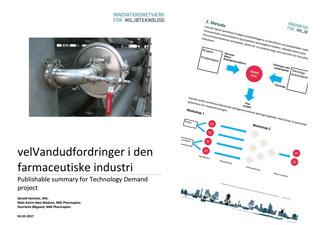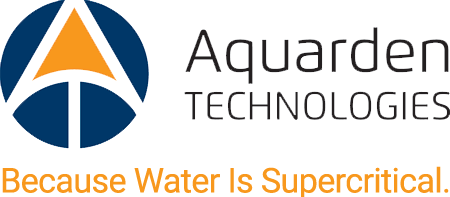The pharmaceutical industry accounts for 23% of the industrial water consumption in Denmark, surpassed only by the food industry (note 1). Pharmaceutical manufacturers also face the challenge of generating wastewater that contains hazardous substances, which cannot be discharged into the sewage system, but must be disposed of in other – and often more costly – ways.
The ‘Technology Demand’ project ‘Water challenges in the pharmaceutical industry’, initiated by Inno-MT, addressed the need for exploring new and alternative water and wastewater technologies in the pharmaceutical industry in Denmark.

Great interest for water and energy efficiency
The project brought problem owners (pharmaceutical companies) and technology suppliers and developers together to describe the challenges of water and wastewater in the pharmaceutical industry, and consequently to formulate recommendations. It was concluded that there is a great interest for water and energy efficiency, although the focus on water efficiency is relatively new. Future limited access to ground water and future regulations are driving forces for improved water efficiency. However, there are many barriers associated with new technologies, including extensive regulation and a requirement for proven and reliable technologies.
Recommendations and new opportunities
A number of recommendations and new routes to increase water efficiency, treat wastewater, and save resources in the production of pharmaceuticals were formulated – here are the some of them:
- Focus on simple projects with clearly saving potential and short payback time.
- Avoid projects in areas that are heavily controlled by the GMP requirements.
- Try innovative technologies at plants that are not GMP-controlled.
- If GMP is affected by the project, the regulatory authorities should be involved from the beginning.
- Reuse of reject water from WFI (water for injection) production for e.g. cooling towers.
- Reduce the volume of waste streams with hazardous components.
- Remove active pharmaceutical ingredients (API) from wastewater by means of separation, adsorption or oxidation processes.
- Sort waste streams in order to reduce volume, and to easier dispose or reuse concentrated waste streams.
The participating companies were:
- Project facilitators: DHI, NNE Pharmaplan
- Problem owners: Biogen, Lundbeck
- Technology vendors and/or developers: Aquarden, Liqtech, UltraAqua, Aquaporin
Want to learn more?
Read the full report (Danish)
https://inno-mt.dk/wp-content/uploads/2016/01/Technology_demand_pharma_pubsum170202-002.pdf
Link to Inno-MT project introduction (Danish)
https://inno-mt.dk/projects/2434/

